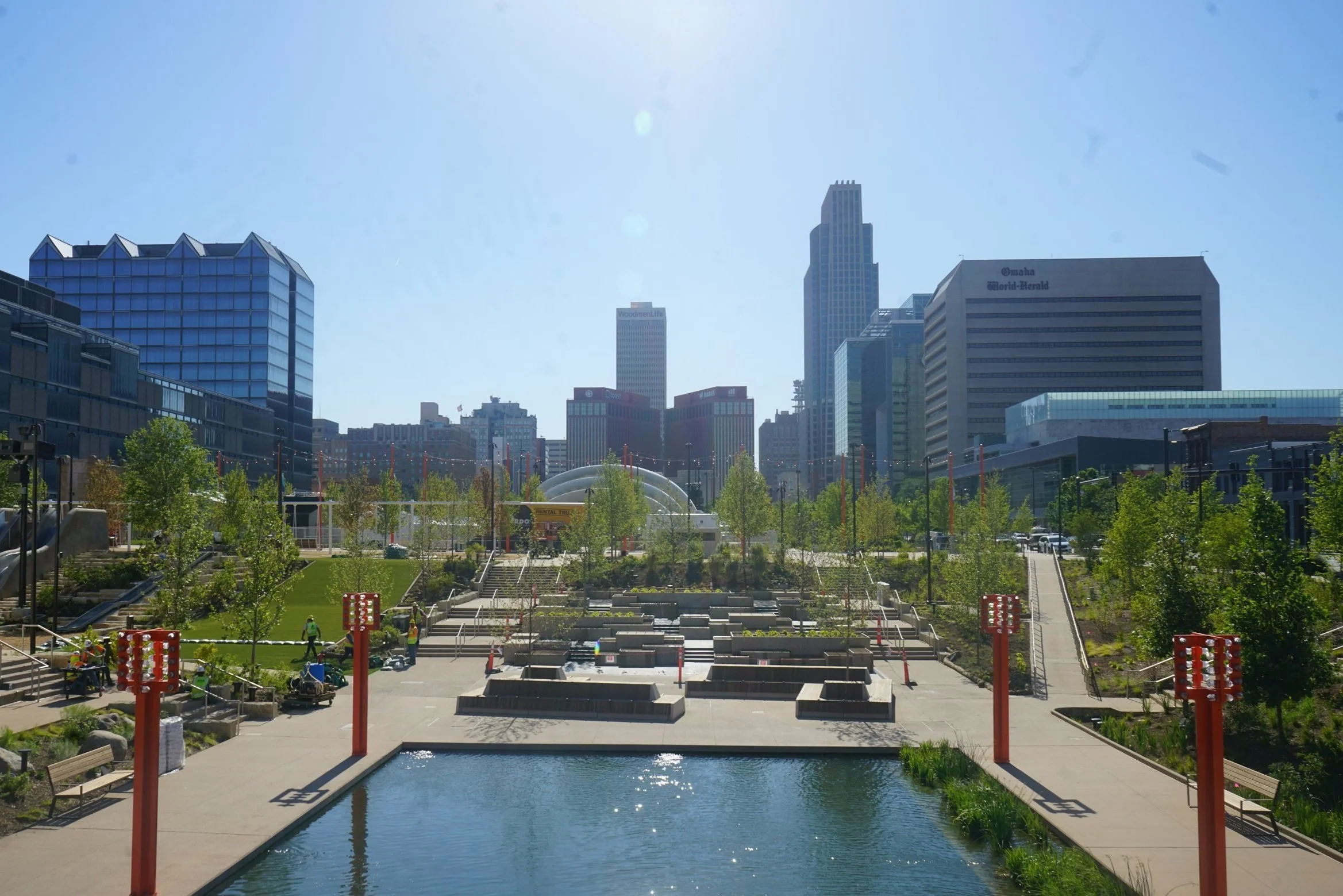Cydney Franklin and Nancy Williams Share Their Vision for the Greenhouse at the Highlander
An aerial view of the Highlander Accelerator. Photo credit: 75 North Revitalization Corp.
by Leo Adam Biga
A North Omaha urban agricultural facility that’s gone unused since it was built four years ago will finally be activated thanks to local Black women-led nonprofits Seventy Five North Revitalization Corp. and No More Empty Pots.
The greenhouse was constructed by Seventy Five North as part of its mixed-use Highlander Village in 2018. The ag space was to be a key cog in the complex’s Highlander Accelerator at 2112 North 30th St. The Accelerator offers educational, health, food and other resources for residents. Urban farm nonprofit Whispering Roots signed on as the greenhouse tenant with a much publicized plan for doing aquaponic and hydroponic growing at scale. That original plan did not come to fruition due to a timing issue, according to Franklin.
The prospect of finally bringing life to this long idle, two-level, 17,500 square foot resource is satisfying for all involved. There’s no lack of interest in it and recent outreach to donors and residents confirms strong buy-in from stakeholders, Seventy Five North President-CEO Cydney Franklin said.
“People do understand how this aligns with this bigger community revitalization strategy Seventy Five North is leading and how it ties into housing, education, wellness and all these things we deem important in our lives,” Franklin said. “I think people are going to be excited to see it under construction and what No More Empty Pots will do in that space. We’re getting calls from people that want to be involved. And that’s exactly what we want to happen.”
The faces of this collaboration speak volumes.
“This is two organizations led by Black women in North Omaha coming together saying we hear you and we are standing in this gap to hold this space for you so that you can demonstrate to everybody else what we already know you’re capable of. That shift is not happening anywhere else. It needs to be talked about,” No More Empty Pots founder-CEO Nancy Williams said. “We don’t usually get this level of support in the community. This is something that could be monumental connecting people to the community in a visceral way. Not in a look-what-we’re-doing-for-you way, but in a look-what-you-helped-bring-forth way that is generationally life-changing for you and the people you care about.”
“This is so true,” Franklin said.
As long as the greenhouse remained in limbo, it could not help strengthen the Highlander community, specifically the Accelerator, as intended, said Franklin. With the greenhouse due to finally come on line, the Accelerator will be fully activated for the first time.
The Accelerator includes:
Hardy Coffee
Creighton University and Metropolitan Community College satellite campuses
Charles Drew Health Center family resources
The Venue event space
Dining Hall (Big Mama’s Kitchen. Best Burger, Dena’s Place)
A digital library
“It’s been a point of frustration and curiosity for people we come in contact with,” Franklin said. “We get calls all the time, what’s going on with the greenhouse? People don’t understand why we developed this massive, state-of-the-art facility in a neighborhood that needs access to the things the greenhouse can provide only to have it empty. They don’t understand why it’s taken so long. I completely understand.”
The Greenhouse will add:
No More Empty Pots’ Culinary Certificate Program for individuals seeking training and resources to become food industry professionals.
A 1,000 square foot commercial kitchen will have educational stations but also double as a space for entrepreneurs to lease. The kitchen will be available for caterers serving the nearby event space, The Venue.
An on-site science lab will facilitate doing extractions and tests of different substances, including bio-derived products for making lotions and botanicals.
A 400-square foot micro market will sell fresh produce from the greenhouse and foods from local farmers and entrepreneurs.
According to Franklin, the facility will also fulfill a longstanding need in the community for year-round growing of fresh produce, increased cold and dry storage as well as packaging and fulfillment space for distribution needs, specialized processing and closed-loop recycling. No More Empty Pots prepares CSAs and meals for clients.
Growing food in a greenhouse will be a departure for the organization.
“We’ve grown things in the ground and with different hydroponic systems, but the greenhouse will be a new challenge for us,” Williams said, “and we are excited about that because we have really strong partners who know how to manage and run greenhouses. It also gives us another line of education and entrepreneurship development because now people can learn how to manage things in a controlled environment. We can also test what grows well. We don’t know all the things we’ll grow, but we know we’re going to start with local greens. The biggest thing I’m excited about is that we will provide year-round access to local greens of high quality.”
Omaha-based Alley Poyner Macchietto Architecture is leading the design of the greenhouse guts.
“We have design drawings and we’re getting close to those being final,” Franklin said. “We are finalizing an RFP for the general contractor that will manage the build-out of the space. We try to focus on as many women, minority-owned small and emerging businesses as we can. We’re going through that process now.
“Everything’s moving swiftly. We hope by summer we’ll have a general contractor in place while we’re finalizing the design. Maybe this fall we’ll submit permits to the city. The earliest that No More Empty Pots could have a certificate of occupancy is the end of September 2023.”
The No More Empty Pots’ leadership team visits the Highlander Accelerator’s greenhouse to tour the facility and celebrate the recent announcement. Left to right: Nick Holden, Kathy Uhlenbrock, Eric Purcell, Leslie Schmeling, Talia McGill, Amy Zeller, Kate Swinarski, and Nancy Williams. Not pictured are Susan Whitfield and Maria Valentin."
The momentum around the project today is in stark contrast to 2018-2020, when things stalled. Franklin said overtures to potential tenants went nowhere. ”Lots of entities and individuals wanted access to the greenhouse, but we couldn’t find the right partner whose mission aligned with ours” or potential partners lacked the capacity to take it on.
After things fell through with Whispering Roots, Seventy Five North twice reached out to Williams, whose Florence-based Food Hub seemed an ideal fit with its programs and networks addressing food insecurity, But Williams twice declined owing to her small team’s hectic schedule. The pandemic induced labor shortage and economic slowdown added new barriers.
When Franklin pitched her again in 2021, Williams agreed. “Cydney convinced me this was the right thing to do for the community,” Williams said. She’s very persistent and persuasive.” Sweetening the pot, Franklin pledged Seventy Five North would raise the dollars to complete the build-out and provide operating funds.
“It’s a multi-million dollar task to do that and that does not include what it takes to operate the facility,” Franklin said.
Sealing the deal, Franklin secured the funds in relatively quick order from a diverse mix of public, private, philanthropic, corporate sources. Thus, this unusual real estate saga will have a resolution after years treading water.
Said Franklin,”In a neighborhood like Highlander where access to healthy food is still a need, this is long overdue.” She promises the greenhouse will deliver “broad community impact and strengthening around food and all the things food touches, which is health, accessibility, affordability, the very things Nancy and her team stand on and that their programs exemplify .”
Social Capital Begets Partners and Big Dollars
Franklin was able to swiftly fulfill the multi-million dollar capital campaign, she said, because of the partner organizations’ demonstrated community-serving capacity. “At Seventy Five North we don’t just build homes and structures, we invest in people, in opportunities, in programmatic experiences around workforce education, recreation, access to digital technology. We create programs around these things to create wrap-around services beneficial to individuals and families living in Highlander.
“No More Empty Pots has a mission that really does align with the scope of work and initiatives Seventy Five North has from an economic mobility, food access and health, well-being lens.”
In 2019 No More Empty Pots opened its Food Hub at 8501 North 30th St. around education, preparation, distribution and careers.
Photo credit: No More Empty Pots
Franklin’s organization has built hundreds of mixed income residential units as well as a senior housing center, and it’s currently building the next phase of Highlander – a 111-unit residential and commercial development between 29th and 30th Streets, south of Burdette Street.
When it came time to ask for money to finish the greenhouse, Franklin said, “We leveraged what we’ve been able to do in Highlander to date – the strength of the infrastructure changes we’ve made. We also leveraged what a partnership between us and No More Empty Pots would look like from a community building lens and all the adjacent, aligned things that come along with it in terms of education access for youth and adults that want to learn about food access – growing their own produce, starting a food-based business. It really was simple to get people on board with this idea.
“So that’s how we got to this point – leveraging the strength of our individual organizations but also the collective strength of the No More Empty Pots and Seventy Five North-Highlander relationship .”
Meant to Be
Though Seventy Five North owns the greenhouse and secured funding for it, Franklin makes clear this is a No More Empty Pots project. “They are going to be running that space and Seventy Five North will partner as appropriate. We think we have a strong resource deployment and system for programs that we hope will fold right into it. But that will be led by No More Empty Pots and we are happy to follow their lead in that regard.”
In some respects, it will be business as usual for No More Empty Pots. Said Williams, “We are taking what we already do well and extending that into the new space but adapting it to meet the needs of the community in that immediate vicinity. We’re asking people what it is they want. We’re trying to build trust in a way that we can get a real assessment of where they are, so that we can then bring to bear resources that are going to actually meet them where they really are, not where they think they are or where other people might think they are. Together we’ll agree this is where you are, this is where you want to go, these are the things we can do to help you.”
No More Empty Pots and Seventy Five North will host public engagement sessions in the summer.
Williams said the resources her organization connects to community “extend beyond just what we have to bear” to a greater partner network.
Both women say they view the project as a lesson in not forcing something to happen but letting it happen when the moment is optimal.
“When we were first approached,” Williams said, “we weren’t ready, it wasn’t our time to do it. And now this feels to be the time because it has been one of the smoothest collaborations, partnerships.”
Given that the project languished only to find the right fit years later, Franklin said she feels “This is the way it was supposed to happen -–no knock to any previous partner. This coming together the way that it has has been really exciting. It’s been a fun challenge to solve for.” (Franklin wrote to NOISE after publication with a correction that Whispering Roots remains a partner and will be a resource in the collaboration.)
Enlisting No More Empty Pots, Franklin said, was “a strategic move” based on “the strength of reputation” Williams and her organization carry. The feedback Franklin’s received from funders, residents and neighbors reinforces the wisdom of the move. “The main response I get is ‘good choice – it makes total sense to partner with them to activate this space.’”
That consensus, she said, “just confirms what I already knew.”


















